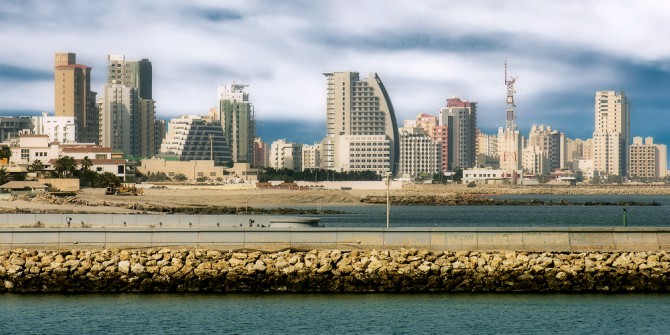India, Japan, Australia, and the US have decided to revive the Quadrilateral Security Dialogue alliance (Quad), with a new focus on building resilient supply chains. The Quad is now focusing on creating a new COVID-19 vaccine value chain, but it aims to expand into renewable technology. Arijit De, Vishal Rana, and Parth Patel write that if the Quad is to be successful, it needs to engage other countries to increase its reach and influence.
The Quadrilateral Security Dialogue, also known as Quad, is a strategic dialogue and alliance between four democracies: India, Japan, Australia and the US. The Quad was created to counter a rising power, China, who in recent times has been perceived as a threat to other developing and less-developed nations. We look at the Quad from the perspective of global supply chains.
So, what is the Quad? The dialogue was initiated in 2007 by Prime Minister Shinzo Abe of Japan and since then had taken a back seat after Australian Prime Minister Kevin Rudd’s uneasiness in dealing with China. Rudd was educated in Chinese Studies, including Chinese language, and in the past acted as the First Secretary of the Australian Embassy in Beijing.
In 2017, all four member nations decided to revive the Quad primarily to counter China militarily and diplomatically in the South China Sea. Since then, the alliance has been gaining momentum towards becoming strategically important for its four member countries. For instance, in November 2020, after a long time since joining this alliance, Australia participated in the Malabar Exercise, a series of naval drills with the remaining members. In February 2021, the four leaders met in Tokyo for the Quad Summit to discuss how the alliance can be bolstered beyond its military dimensions.
There are many conspiracy theories suggesting that the SARS-CoV-2 virus, which leads to COVID-19, could have been a biological weapon developed by China in its Wuhan Institute of Virology laboratory. While the focus of this piece is not on whether there is any substance to these theories, and the investigations will take their own course, one thing is clear: the pandemic has become a major stumbling block for the Chinese government. It has created a huge trust deficit and the world has no choice but to look for ways to reduce its dependence on China, specifically for the supply of goods and services. This is where the Quad alliance is now expanding its dialogue.
A vaccine supply chain
The leaders of the alliance aim to collaborate and create a resilient supply chain to deal with the COVID-19 pandemic. They want to ensure that vaccines are developed in the US, manufactured in India, and financed by Japan and the US, as well as supported by Australia through logistics and last-mile distribution.
This initiative has the potential to enhance India’s manufacturing capacity in pharmaceuticals and increase exports to the Indo-Pacific region. By focusing on the strengths and capacities of each member, the Quad can expedite global vaccine delivery, helping to bridge the vaccine demand-supply gap. One goal is to deliver 1 billion vaccines to the Association of Southeast Asian Nations (ASEAN) by the end of 2022.
India’s role within this vaccine initiative can potentially reinforce the country’s credentials as a trusted manufacturer of quality vaccines and strengthen its reputation as the “pharmacy of the world”. Vaccine manufacturing within Quad supply chains could provide India with a major competitive advantage in the pharmaceutical sector, without concerns about market accessibility and intellectual property rights. Also, access to advanced technologies would give a boost to India’s research and development (R&D).
Securing a supply chain for renewable technology
The Quad could help overcome territorial disputes that have disrupted the existing global supply chain and advance the security and economic interests of the member nations. One aim is to collaborate in addressing climate change by advancing a credible alternative to China-driven supply chains, creating new value chains for renewable technology under the regional comprehensive economic partnership (RCEP).
Currently, any trade tension between China and other Quad nations can disrupt trade. To reduce overreliance on China, a Quad-led solar technology chain should build an alternative manufacturing base in India. This would help alliance members achieve their solar energy targets. It would also explore the Indo-Pacific market for solar technologies, eliminating the risk of an intentional trade halt, which could adversely impact the Indo-Pacific region.
Another goal is to procure rare-earth metals, making alliance members resilient to Chinese dominance. According to the US geological survey report, China produced nearly 58 per cent of the world’s rare-earth metals in 2020, down from 90 per cent some four years ago, as the US and Australia gradually increased their production. These rare-earth metals are crucial for the manufacturing of smartphones, computers, hard-disk drives, laptops, high-performance motors, electric vehicle batteries, wind turbines and other components of the “decarbonisation” infrastructure.
In 2020, the US, Australia, and India accounted for 16 per cent, 7 per cent and 1 per cent respectively of the global rare-earth metal production. India accounts for 6 per cent of the world’s rare-earth reserves, while Japan is one of the biggest rare-earth consumers. The global demand of rare-earth elements could reach a staggering 51.9 thousand metric tonnes by 2030 (See the article by Zhou, Li and Chen, 2017 for more details on the current demand). The Quad will have to collaborate along the supply chain of rare-earth metals, from production to consumption, to increase their influence in this sector and counter the dominant role currently played by China.
There is growing agreement between Quad members that as China continues to rise as the next superpower, there is a greater need for preserving the rules-based order for a free and open Indo-Pacific that respects territorial integrity and sovereignty. At the same time, the Quad’s ability to present a viable alternative for promoting free trade can be a giant leap forward. While some experts and thinktanks view the Quad’s role as purely countering China’s rise, others see it as an opportunity to create new economic possibilities. No matter how you see it, it is clear that the Quad has grown in stature and has already made a major impact on international relations. So much so that China is warning some countries against joining the alliance.
If the Quad is to be really successful in countering an increasingly assertive China, it will need to extend its cooperation into various spheres. It will also need to pursue a more aggressive diplomacy by engaging other countries to increase its reach and influence. If the Quad manages to do this, then it will present a serious counterbalance to China’s rise and assertiveness in South Asia and the Indo-Pacific region.
♣♣♣
Notes:
- This blog post expresses the views of its author(s), and do not necessarily represent those of LSE Business Review or the London School of Economics.
- Featured image by Bruce Röttgers on Unsplash
- When you leave a comment, you’re agreeing to our Comment Policy





